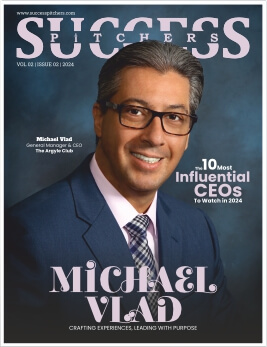At the top of his organization, Michael Vlad stands as a distinguished figure in the realm of hospitality, serving as the General Manager and CEO. Tasked with overseeing the operations and strategic direction of one of San Antonio’s oldest and most prestigious private dining clubs, Michael Vlad brings over 20 years of invaluable experience to the table.
Passionate about instilling a service mindset culture, strategic planning, cultivating high-performance teams, and ensuring financial sustainability, Michael has become a driving force in the industry. His journey is shaped by a solid academic foundation in hospitality management and business acquired from the Arts Institute of New York City and Cornell University. Further honing his leadership skills, he successfully completed the Berkeley Chief Executive Officer Program at the UC Berkeley Haas School of Business, equipping him with the tools to lead with purpose, vision, and innovation.
Michael Vlad leverages his extensive expertise and credentials to elevate the quality and reputation of The Argyle Club. Beyond operational excellence, he is dedicated to fostering a culture characterized by excellence, diversity, and social responsibility. Join us as we delve into Michael Vlad’s commitment to crafting exceptional experiences and leading his organization into a future defined by purpose and innovation.”
Shaping Values Through Hospitality
Michael Vlad reflects on how the first seven years of his life instilled fundamental values of hospitality in him—values centered around sharing, caring, and respecting one another. These principles have become deeply ingrained in his character and value system, shaping his approach to both personal and professional interactions.
In the dynamic world of the hospitality industry, adaptability and problem-solving are crucial skills. Michael Vlad attributes his studies in hospitality to fostering critical thinking and adaptability to new norms. The hospitality field, with its array of challenges and opportunities, has contributed to his ability to navigate and excel in an ever-changing environment.
Fostering a Service Mindset Culture
The service mindset culture envisioned is deeply rooted in a passionate commitment to treating employees and teams with the same level of respect and care as guests, clients, vendors, and members. This commitment goes beyond professional growth to encompass personal development, including support for continuing education, career growth, family matters, and financial management. The organization places a strong emphasis on the ability to connect and inspire, considering it a cornerstone of its service mindset culture.
Collective accountability is a significant component of fostering employees’ psychological safety. This involves creating an environment where employees feel that they are collectively responsible for achieving overall organizational objectives and performance. Through these strategies, the organization aims to build a community of professional individuals dedicated to maintaining a service mindset culture. This culture ensures that every team member is committed to delivering exceptional experiences that surpass the expectations of club members.
Purpose-Driven Culture
Michael Vlad emphasizes the importance of having a strong purpose or “why” to overcome challenges and adversities. He draws inspiration from Friedrich Nietzsche’s idea that a strong purpose allows individuals to endure any challenges they may face. Michael’s leadership philosophy revolves around establishing a clear and inspiring vision that guides the entire organization. He believes in cultivating a high-performance culture by focusing on principles such as vision, values, member centricity, team empowerment, adaptability, and effective communication.
Furthermore, Michael Vlad underscores the significance of creating a positive, diverse, and inclusive organizational culture centered on psychological safety. Core values that align with the organizational mission are essential for fostering unity and pride among staff members. A positive workplace culture contributes to employee satisfaction, increased productivity, and an exceptional member experience.
Transformative Leadership
Michael highlights the transformative impact of completing the Berkeley Chief Executive Officer Program on his leadership style. The program has played a key role in enhancing his strategic thinking, leadership skills, and fostering a global perspective. Through this experience, Michael has been able to realign cultural objectives with organizational goals, influencing strategic planning within his organization.
The program’s influence is evident in Michael’s leadership approach, which now emphasizes innovation, adaptability, financial sustainability, and an unwavering commitment to providing an exceptional member experience. The Berkeley CEO Program has served as a catalyst for refining and elevating the strategic direction of his organization.
Putting Members First
Michael emphasizes the importance of placing members at the center of every initiative at The Argyle Club. The team prioritizes member needs and preferences in day-to-day operations, employing regular feedback and surveys to understand expectations. A key advancement in this approach is the introduction of the Membership Analytics Predictor (MAP) solution.
MAP represents a groundbreaking AI predictive analytics tool in the club industry. It leverages five different variables to define engaged members using existing data. The tool creates models to identify engaged members and predict those at risk, offering instant insights into individual member activity trends. This allows for a proactive re-engagement strategy for members who fall below the set engagement threshold. The implementation of MAP signifies a data-driven approach to member satisfaction and engagement.
Assessing and Reinforcing Core Values
Michael highlights an initiative that involved engaging the leadership team in a series of assessments aimed at understanding the current Organizational Cultural Profile. The assessments were designed to evaluate whether the results align or misalign with organizational objectives.
The insights gained from these assessments revealed a culture deeply rooted in values such as integrity, being member and employee-centric, collaboration, results-orientation, and adaptability over time. These core values are identified as the foundation of the company’s culture and play a pivotal role in driving its strategic success. Understanding and reinforcing these cultural elements is crucial for maintaining a cohesive and effective organizational environment.











